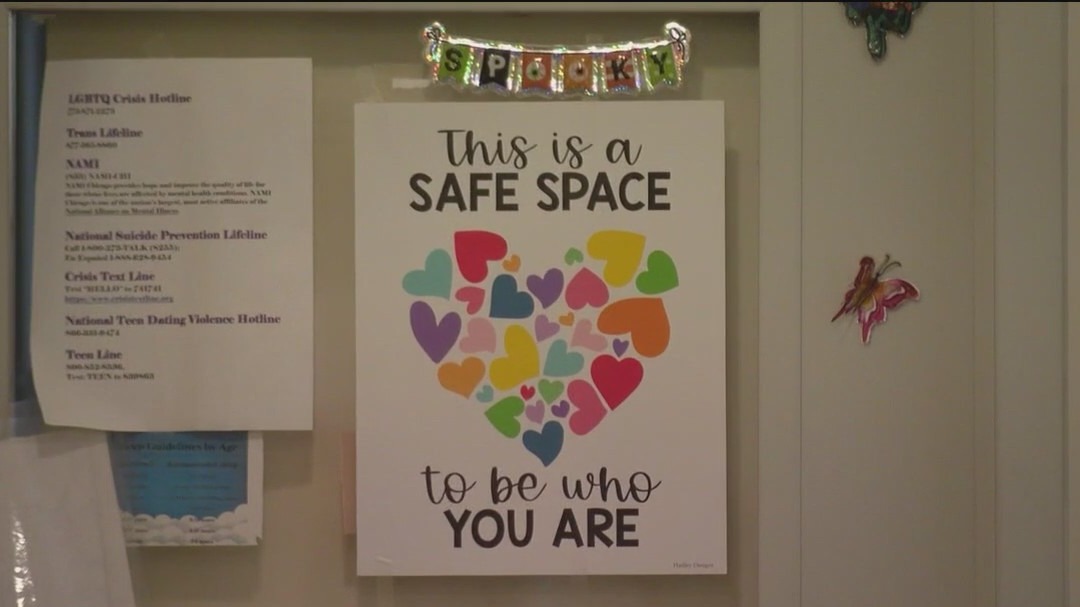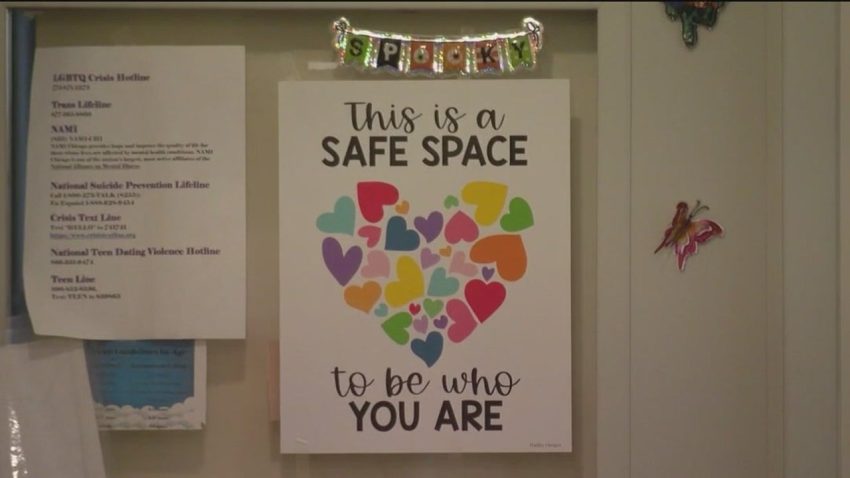
CHICAGO – Every day, dozens of people across Illinois take brave steps to escape domestic abuse.
Help is available — and it’s making a real difference — but many survivors don’t know where to start. That’s why access to intervention and resources is critical to saving lives.
What we know:
For four decades, WINGS Program has given women and men the courage to break free from abuse and move toward a safer and brighter future.
“Those of us on the front lines are seriously dedicated to this work, growing from only serving about 12 families at a time, to now, serving hundreds of families at time through all of our housing platforms,” said Rebecca Darr, president & CEO of WINGS Program.
As the largest domestic violence organization in Illinois, WINGS Program is the only one in the state that operates two safe houses.
“What people need to understand is the most dangerous time for a victim is when they’re trying to leave,” Darr explained.
To protect survivors, WINGS Program does not disclose the exact locations of its safe houses, but one is in the Northwest Suburbs and the other on the city’s Southwest Side.
“From there our families can move into different kinds of housing but usually apartments where they can stay for up to two years and really fully recover financially and emotionally from what they’ve gone through,” Darr said.
WINGS provides both emergency and transitional housing, counseling, and case management — offering a safe haven, a support system, and a chance to break the cycle for this generation and the next.
“Which is our goal, our goal is to be out of business,” Darr added.
Darr has been working toward that goal for more than 25 years.
“The number one reason that people don’t leave is money and fear,” Darr said. “The number one reason people go back is money. They don’t have the financial resources to move forward.”
To help survivors rebuild their lives, the organization also provides support with legal education, budgeting, and career goals.
“We have found that when they go through our two-year transitional program, we have a 100 percent success rate that they don’t go back to the abuser they left, and they don’t go forward to a new one because they don’t have to,” Darr shared.
During their stay, WINGS also works with kids, assigning each child an advocate.
“It is extremely traumatizing to the child. Children believe that one, it’s their fault, two, that somehow they can stop it, and we know neither of those are true,” Darr said.
Dig deeper:
Despite the tireless work of advocates, countless domestic violence situations end in tragedy.
“And that’s the ultimate control that the abuser has over them — is to take their life,” Darr said.
Darr explains that it is critical for women and men experiencing abuse to create a safety plan.
“I want to make sure that viewers know that it isn’t just hitting. We’ve had survivors come to us who have experienced years and years of emotional-psychological abuse and were never hit, not even one time,” Darr said. “And what they have said is that emotional abuse is just as scarring on the inside as physical is on the outside.”
When it comes to leaving an abusive relationship, Darr says the Illinois Domestic Violence Hotline is the best place to start.
“It is a hard call to make,” she said.
“But we really are trying to meet each and every survivor where they are and understand that most survivors try to leave seven times before they finally are successful,” added Amanda Pyron.
Pyron is the CEO of The Network: Advocating Against Domestic Violence, which leads the Illinois Domestic Violence Hotline. The hotline can be reached at 877-863-6338.
“The first question we ask at the Illinois Domestic Violence Hotline is, ‘Are you safe?’ Because first and foremost, we want to make sure that someone can talk to us when they call, that they aren’t in any immediate danger,” Pyron explained. “And then we work through what their situation is as they define it. How they see what their strengths are, what their challenges and opportunities are. We talk through situations that might arise.”
By the numbers:
The Illinois Domestic Violence Hotline averages more than 160 calls per day.
“Most of our calls do come from survivors, and so the fact that we can answer contacts via text, chat, or phone in English or Spanish, and have access to over 240 other languages is really critical,” Pyron said.
In 2024, the hotline received 58,803 contacts originating from 96 of Illinois’ 102 counties.
Pyron emphasizes that the hotline is completely confidential.
“Leaving isn’t safe for every survivor, but staying isn’t either. And so, we want to make sure that we can always offer the best option for a survivor at a particular point in time,” Pyron said.
The hotline works to connect those experiencing abuse with emergency shelter and crisis intervention.
“We really are a foundation for access to services in the greater Cook County region and throughout the state,” Pyron said.
Pyron and Darr are also highlighting the passage of Karina’s Law.
“When there are guns in the home, the victim is 500 times more likely to be killed. And Karina Gonzalez was killed in Little Village,” Darr said. “She had an Order of Protection against her husband. They did not take his guns. He had the guns, went straight to her, killed her and their daughter and shot their son who lived.”
Gonzalez was killed in July 2023. Gonzalez’s husband, Jose Alvarez, was charged in the death of Gonzalez and their 15-year-old daughter, Daniela Alvarez.
Karina’s Law, or Public Act 103-1065, requires firearms to be removed from an abuser if they are served an Order of Protection.
It’s a positive step forward, but the work and the need continue.
What they’re saying:
“We need the community’s support to do more,” Darr expressed. “Many people think that the government, local, city, state, and federal funds everything that we do. That could not be further from the truth.”
WINGS Program relies on donations, while the Illinois Domestic Violence Hotline is funded in partnership with Chicago’s Department of Family and Support Services (DFSS).
“One of our biggest challenges at the hotline is that we receive more calls for shelter than we can place people in housing,” Pyron said.
Pyron points to an alarming statistic from last year: For 130 days, there were no available beds or cribs in domestic violence shelters in Chicago.
“And it’s incredibly frustrating for our advocates who hear these stories every day and hear people crying on the phone that they’re in an unsafe home,” Pyron added.
Still, she says hotline staffers are highly trained, and will help guide callers, weigh their risks, and place them into emergency housing as soon as possible.
“Trust your instincts and reach out for help,” Pyron said. “It doesn’t cost anything to reach out and ask for help or ask questions. The earlier you do, the more you can plan.”
What you can do:
If you or someone you know needs help — the Illinois Domestic Violence Hotline can be reached at 877-863-6338 (877-TO END DV).
Meanwhile, there are powerful ways supporters can make a difference, including:
- Donate to organizations like WINGS Program and The Network
- Volunteer with nonprofits that provide domestic violence resources
- Serve on the board of a charitable organization
- Shop at one of three WINGS Resale Shops where every purchase counts toward client services.
WINGS has resale stores at the following locations:
- 1302 N. Rand Rd., Arlington Heights, IL
- 300 W. Golf Rd., Schaumburg, IL
- 8349 W. Golf Rd., Niles, IL
The Source: Information in this article was gathered by FOX 32’s Kasey Chronis through interviews at WINGS Program and The Network. Statistics were provided by the experts interviewed for this piece, and through The Network’s Measuring Safety: Gender-Based Violence in Illinois 2024, Volume 3.

